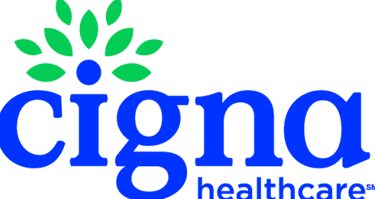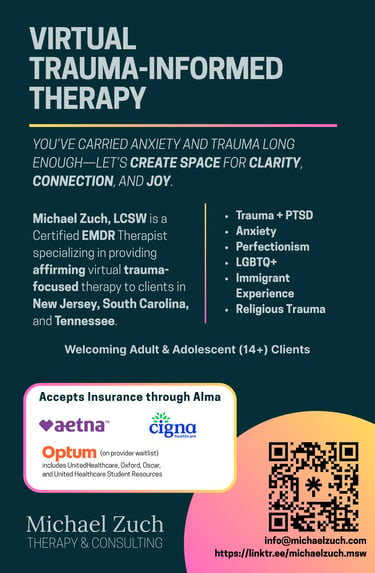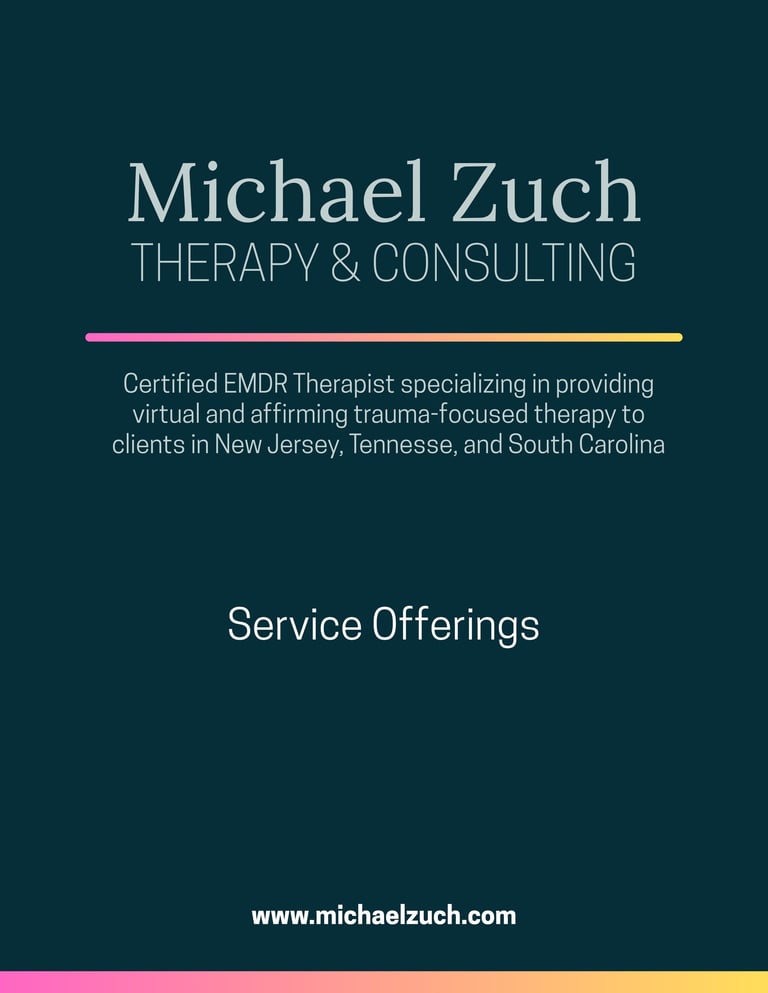Services Offered
Providing virtual trauma therapy for adolescents and adults in New Jersey, Tennessee, and South Carolina.
Therapy with Adults or Adolescents


Adjunctive EMDR Therapy
Adjunctive EMDR therapy is shorter-term and available for clients already in treatment with other therapists who want to address specific traumatic memories to enhance their other therapeutic work.
I provide training and consultation around topics of trauma, complex trauma, religious harm, cross-cultural mental health, child development, or social science research.
Previous clients include nonprofit organizations in Austria and Myanmar, as well as social movement spaces and faith communities in the US.
Training & Consultation




Traditional therapy sessions to reach therapeutic goals and grow your capacity for distress and connection.
Insurance and Fees:






Includes UnitedHealthCare, Oxford, Oscar, and UnitedHealthCare Student Resources
I also see direct-pay clients at $150 per 60 minute session. I can provide a superbill if you would like to use Out-of-Network benefits with your insurance.
South Carolina clients: I can only accept direct-pay at this time. I may have sliding scale fees available. Please email if interested.
What to Expect:
The Therapy Process
1. Initial Contact
Start by reaching out via email (info@michaelzuch.com) to schedule a free 15-minute consultation call. This is a chance for us to briefly connect, talk about what you're looking for, and see if it feels like a good fit.
For teen clients, I often speak to at least one legal guardian in the intake process.
2. Insurance or Self-Pay Setup
If we decide to move forward, I’ll submit your information to Alma or Headway, platforms that verifies your insurance coverage. If you’re not using insurance, we’ll confirm the self-pay rate.
3. Paperwork + First Session Scheduling
Once your coverage is confirmed, we’ll schedule your first session. I’ll also send you intake forms through a secure, HIPAA-compliant platform. These include consent forms and some questions about your goals, which help me prepare and meet documentation needs.
For teen clients, I have paperwork for both them and their guardians to complete.
4. Getting Started
Our first 2–3 sessions are a space to get to know each other and explore how it feels to work together. We’ll then revisit whether it feels like a good fit and collaborate on a treatment plan that aligns with your goals.
For teen clients, I will meet with them and one of their guardians for part of the first session. This is to ensure we are all on the same page about confidentiality and the therapy process.
5. Ongoing Sessions
We meet regularly based on your needs and the treatment plan we’ve created. Session frequency and duration are flexible and tailored to what works best for you.
Because I believe meaningful change is often sustained through connection, I may invite you to bring in people from your life, partners, family members, or chosen family, for a few sessions. This is always optional, but involving your community can help deepen insight, strengthen social support, and create accountability that carries our work beyond the therapy room.
For teen clients, I require parent sessions with their guardians at least once every other month. I may also integrate family therapy as needed.
6. Closure and Goodbye
When the time comes to end therapy, we’ll do so intentionally. Saying goodbye can be meaningful—and a chance to reflect on your growth and practice parting on good terms.







